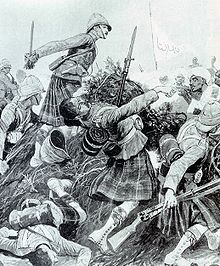The Battle of Atbara also known as the Battle of the Atbara River took place during the Mahdist War. Anglo-Egyptian forces defeated 15,000 Mahdists on the banks of the River Atbara. The battle proved to be the turning point in the reconquest of Sudan by the British and Egyptian coalition.[2][3]
| Battle of Atbara | |||||||
|---|---|---|---|---|---|---|---|
| Part of the Mahdist War | |||||||
 The Seaforth Highlanders at the battle: Richard Caton Woodville, Jr.[1] | |||||||
| |||||||
| Belligerents | |||||||
|
|
| ||||||
| Commanders and leaders | |||||||
| Horatio Herbert Kitchener |
Mahmud Ahmad (POW) Osman Digna | ||||||
| Strength | |||||||
| 14,000 troops |
12,000 infantry 3,000 cavalry | ||||||
| Casualties and losses | |||||||
|
|
3,000 killed and wounded 2,000 captured | ||||||

By 1898, the combined British and Egyptian army was heading south, advancing up the Nile into Sudan. The Sudanese Mahdist leader, the Khalifa Abdallahi ibn Muhammad ordered the Emir Mahmud Ahmad and his 10,000 strong army of western Sudan northward towards the junction of the Nile and the River Atbara to engage the British and Egyptian army led by Herbert Kitchener.[4]
Encamping on the banks of the Atbara river by March 20, Mahmud, with Osman Digna's group of Mahdist warriors were within 20 miles (32 km) of the British camp outpost at Fort Atbara at the confluence of the Atbara with the Nile. On April 4, after seeing that the Mahdists were unwilling to attack, Kitchener quietly advanced with the British and Egyptian army towards the Mahdist fortified camp just outside the town of Nakheila.[4]
The Anglo-Egyptian attack began at 06:20 on 8 April 1898. Three brigades, the British Brigade led by William Gatacre, and two Brigades of the Egyptian Division led by Archibald Hunter, led the attack.[5] After a brief artillery bombardment of the Mahdist camp, the combined British and Egyptian brigades attacked.[6] Soon, the British and Egyptian troops were in the Mahdist camp, often fighting hand-to-hand with the Mahdist warriors. After 45 minutes, the battle was over as Osman Digna led a few thousand warriors on a retreat to the south, while most of the remainder were killed or captured, including Mahmud who was captured by loyal Sudanese troops of the Egyptian Brigade.[6]
The battle was celebrated by the Scottish poet William McGonagall.